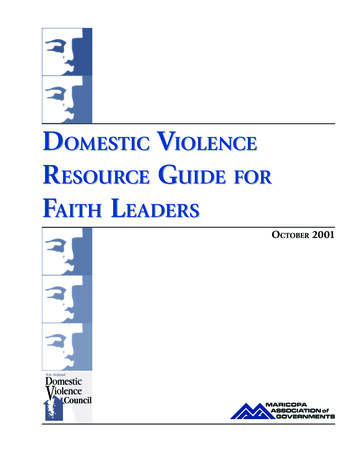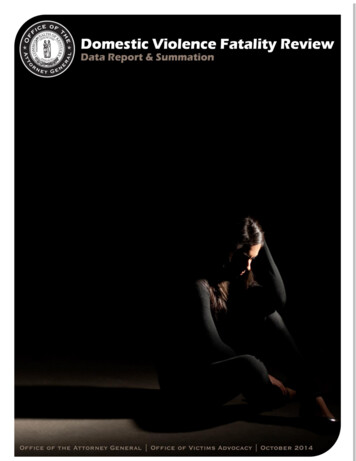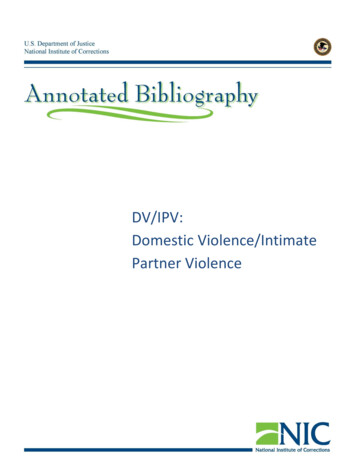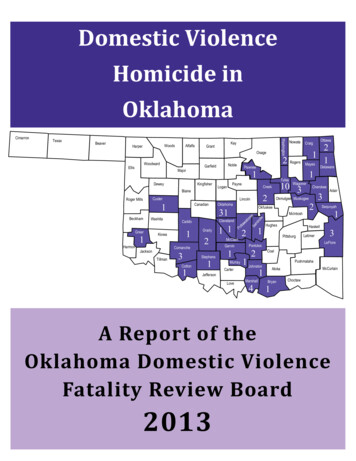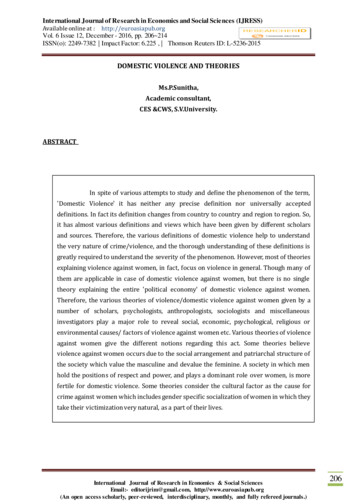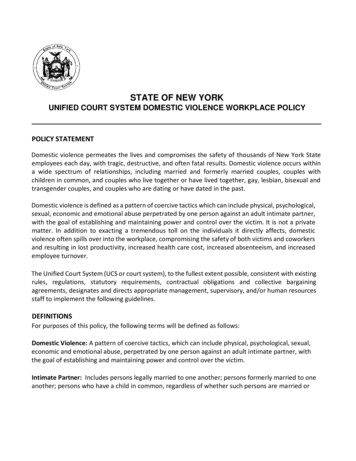
Transcription
STATE OF NEW YORKUNIFIED COURT SYSTEM DOMESTIC VIOLENCE WORKPLACE POLICYPOLICY STATEMENTDomestic violence permeates the lives and compromises the safety of thousands of New York Stateemployees each day, with tragic, destructive, and often fatal results. Domestic violence occurs withina wide spectrum of relationships, including married and formerly married couples, couples withchildren in common, and couples who live together or have lived together, gay, lesbian, bisexual andtransgender couples, and couples who are dating or have dated in the past.Domestic violence is defined as a pattern of coercive tactics which can include physical, psychological,sexual, economic and emotional abuse perpetrated by one person against an adult intimate partner,with the goal of establishing and maintaining power and control over the victim. It is not a privatematter. In addition to exacting a tremendous toll on the individuals it directly affects, domesticviolence often spills over into the workplace, compromising the safety of both victims and coworkersand resulting in lost productivity, increased health care cost, increased absenteeism, and increasedemployee turnover.The Unified Court System (UCS or court system), to the fullest extent possible, consistent with existingrules, regulations, statutory requirements, contractual obligations and collective bargainingagreements, designates and directs appropriate management, supervisory, and/or human resourcesstaff to implement the following guidelines.DEFINITIONSFor purposes of this policy, the following terms will be defined as follows:Domestic Violence: A pattern of coercive tactics, which can include physical, psychological, sexual,economic and emotional abuse, perpetrated by one person against an adult intimate partner, withthe goal of establishing and maintaining power and control over the victim.Intimate Partner: Includes persons legally married to one another; persons formerly married to oneanother; persons who have a child in common, regardless of whether such persons are married or
have lived together at any time, couples who live together or have lived together, or persons who aredating or who have dated in the past, including same sex couples.1Abuser: A person who perpetrates a pattern of coercive tactics which can include physical,psychological, sexual, economic, and emotional abuse against an adult intimate partner, with the goalof establishing and maintaining power and control over the victim.Victim: The person against whom an abuser directs coercive and/or violent acts.GUIDELINESI. Employee AwarenessEmployee awareness regarding the dynamics of domestic violence and the available sources ofassistance is critically important. Information on the dynamics of domestic violence and the DomesticViolence Workplace Policy shall be integrated into existing materials and literature, policies, protocols,and procedures, as appropriate.2 The Domestic Violence Workplace Policy will be placed on UCSintranet and internet sites and will be disseminated to all Judges and nonjudicial employees uponimplementation and upon election, hiring or appointment.a.Information and available resources relating to domestic violence shall be postedwhere employees can obtain information and resources without having to request it orbe seen removing it. Such sites may include, but are not limited to: UCS intranet andinternet sites, employee bulletin boards and newsletters, rest rooms and lounge areas.Posted information should include available sources of assistance, such as: contactinformation for local domestic violence service providers, the number for the NYSDomestic Violence and Sexual Assault hotline, and/or information about court systempersonnel who are trained and available to serve as confidential sources ofinformation, support and referral. A court system contact information poster will bemade available to every court location.b.The Director of Court Operations is designated as the court system's OPDV Liaison(UCS/OPDV Liaison). The UCS/OPDV Liaison will ensure agency-wide implementation ofthe Domestic Violence Workplace Policy and serve as the primary contact with OPDV.c.The court system's WorkLife Assistance Program, Corporate Counseling Associates(CCA), a private, professional resource, which provides free and confidential assistanceto all court system Judges and employees and their family members, is an importantresource for victims of domestic violence and their coworkers. Whenever there is an1 This definition may extend to other circumstances such as abuse of a parent by an adult child; however,the primary focus of this policy is adult, intimate partner violence.Whenever possible, the Domestic Violence Workplace Policy should also be extended to consultants,contractors, and other non-state on-site providers.2
employee issue involving domestic violence, there should be a referral to CCA.Work/Life Assistance Program counselors are available for short-term counseling and, ifnecessary, may provide a referral for continued or specialized care. More informationcan be found on the court system's intranet and internet sites, as well as CCA's websiteat http://www.corporatecounseling.com/ (member log-in: UCS).3d.The Domestic Violence Workplace Policy shall be reviewed annually and, forinformational purposes, the UCS/OPDV Liaison will forward policy or guideline revisionsand updates to OPDV.II. Workplace Safety PlansDomestic violence workplace safety response plans are critical to the security of victimized employeesand their co-workers. An emergency security response plan should include procedures for contactingthe appropriate law enforcement agency and provide employees with clear instructions about whatto do and who to contact if they observe anyone engaging in threatening behavior. Such a plan willallow appropriate actions to be taken if a domestic violence perpetrator gains unauthorized access tothe work site or engages in any acts that threaten the safety of employees or clients.Victimized employees shall be consulted for the development and implementation of individualizedworkplace safety plans, which may include:3a.advising co-workers and, upon request, the employee's bargaining representative, ofthe situation;b.setting up procedures for alerting UCS security and local law enforcement;c.temporarily relocating the victimized employee to a secure area;d.providing options for voluntary transfer or permanent relocation to a new work site;e.changing a work schedule;f.reassigning a parking space;g.providing an escort for entry to and exit from the building;h.responding to telephone, fax, e-mail or mail harassment; and,Referrals may also be made to domestic violence programs that can be found on the New York StateOffice for the Prevention of Domestic Violence's (OPDV) website athttp://opdv.ny.gov/help/fss/contents.html.
i.keeping a photograph of the abuser and/or a copy of any existing orders of protectionin a confidential on-site location and providing copies to security personnel.All known court orders of protection, including those in which domestic violence perpetrators havebeen ordered to stay away from the work site, shall be complied with. The court system may facilitatethe enforcement of any existing orders by assisting victimized employees or law enforcement officialsin gathering and providing evidence related to whether the terms of an order have been violated.Additional concerns will need to be addressed if the victim and the offender are both employed byUCS.Throughout the development and implementation of collective and individual domestic violenceworkplace safety response plans, the court system's confidentiality policy and limitations to this policymust be disclosed. Individualized domestic violence workplace safety plans should be reviewedperiodically to ensure that they remain effective for addressing workplace safety concerns.III. Responsive and Non-Discriminatory Personnel PoliciesThe court system ensures that personnel policies and procedures do not discriminate against, and areresponsive to the needs of, victims of domestic violence. If there are any questions or concernsregarding the application of this policy, contact the Office of Court Administration's Division of HumanResources.a.New York State law makes it a crime for employers to penalize an employee who, as avictim or witness of a criminal offense, is appearing as a witness, consulting with adistrict attorney, or exercising her/his rights as provided in the Criminal Procedure Law,the Family Court Act, and the Executive Law. The law requires employers, with priorday notification, to allow time off for victims or subpoenaed witnesses to exerciseher/his rights as provided in the Criminal Procedure Law, the Family Court Act, and theExecutive Law [Penal Law 5215.14].b.New York State law prohibits insurance companies and health maintenanceorganizations from discriminating against domestic violence victims. The law alsoprohibits designation of domestic violence as a pre-existing condition. An insurancecompany cannot deny or cancel an insurance policy or require a higher premium orpayment because the insured is or has been a domestic violence victim [Insurance Law52612.]c.When an employee needs to be absent from work as a result of being a victim ofdomestic violence, or to assist a family member who has been a victim of domesticviolence, management will assist the employee in the best use of attendance and leavebenefits, taking into consideration the employee's particular situation.
d.Where UCS policies require an employee to submit documentation to justify absences,management is aware of and sensitive to the fact that victims of domestic violence maylack the required documentation or have difficulty obtaining the requireddocumentation without compromising their safety. Therefore, the employee will beconsulted with to identify available documentation that satisfactorily meets thedocumentation requirement without compromising safety-related concerns.e.When there is a change in status connected to their victimization, employees who arevictims of domestic violence shall be allowed to make reasonable changes to benefitsat any time during the calendar year.f.Inquiries about a job applicant's current or past domestic violence victimization areprohibited. Employment decisions must not be based on any assumptions about orknowledge of prior domestic violence concerns.4g.Where an employee's work performance difficulties are the result of being a victim ofdomestic violence, management should work with the employee to ensure that all ofthe proactive measures outlined in this policy are extended, and provide the employeewith clear information about performance expectations and performance evaluation.h.41.If a disciplinary process is initiated, special care shall be taken to consider allaspects of the victimized employee's situation, and all available options shall beutilized in working to resolve the performance problems, including making areferral to the WorkLife Assistance Program.2.If reasonable measures have been taken to resolve domestic violence relatedperformance problems of a victimized employee and the performance problemscontinue and the employee separates from service, management will advise theemployee of potential eligibility for unemployment insurance and promptlyprovide information needed in the claims process. New York State law providesthat a victim of domestic violence who voluntarily separates from employmentmay, under certain circumstances, be eligible for unemployment insurancebenefits [Labor Law 5593].Pursuant to New York State and federal law, a person convicted of a domestic violencerelated crime or subject to an order of protection, under certain circumstances, forfeitsthe right to legally possess a firearm or long gun. Employees who are authorized tocarry a firearm as part of their job responsibilities are required to notify their managerif they are arrested on a domestic violence-related offense and/or served with an orderof protection. Failure to notify may result in disciplinary action.Because there may be confidentiality issues associated with the submission of documentation inthese instances, the UCS/OPDV Liaison should be consulted.
IV.Accountability for Employees who are Offenders and Employees Who EnableOffendersCourt system employees will be held accountable for engaging in any of the following behaviors:(1) misusing state resources, such as work time, workplace telephones, computers, e-mail, faxmachines, mail, state vehicles or other means, to commit an act of domestic violence; (2) committingan act of domestic violence from or at the workplace or from any other location while on officialstate business; or (3) misusing their job-related authority and/or state resources in order tonegatively affect victims and/or assist perpetrators in locating a victim and/or in perpetrating an actof domestic violence. Corrective or disciplinary action will be taken against any employee who isfound to have threatened, harassed, or abused an intimate partner at the workplace, from theworkplace, while on state business or using state resources.a.Corrective action may be warranted in cases where it is found that an employee isresponsible for a domestic violence-related offense or is the subject of any order ofprotection, including temporary, final or out-of-state, as a result of domestic violence,and said employee has job functions that include the authority to take actions thatdirectly impact victims of domestic violence.b.If an employee intentionally misuses job-related authority and/or state resources tonegatively impact a victim of domestic violence, assist an abuser in locating a victim orperpetrating acts of domestic violence, or protect an abuser from appropriateconsequences for such behavior,5 the employee shall be subject to corrective ordisciplinary action.V. TrainingThe court system is committed to providing Domestic Violence Workplace Policy training on a regularbasis for all court system personnel. Training shall include information on the ways in which domesticviolence impacts the workplace, including the potential impact on worker productivity and the safetyrisks to on-site personnel and visitors.5a.Training on the dynamics of domestic violence and its impact on the workplace shall bemade available on an on-going basis for all managers, supervisors, human resourcesprofessionals, and uniformed personnel.b.Training for union representatives will also be made available and strongly encouraged.Examples of actions that may "protect an abuser from appropriate consequences" include but arenot limited to: withholding from or providing false information to supervisors or other authorities;destroying or tampering with evidence or documentation of an abuser's act(s) of domestic violence;assisting an abuser in filing false claims against the victim; and failing to report violations of employerpolicy or of the law.
VI. Management ResponsibilityAll managers and supervisors are responsible for setting a tone that communicates domestic violencerelated behavior will not be tolerated; reviewing and following the procedures set forth in this policy;and actively providing information and support to employees who are victims of such abuse. Managersand supervisors should ensure that their employees are aware of the court system's Domestic ViolenceWorkplace Policy.VII. Confidentiality and ReportingInformation related to an employee who is a victim of domestic violence shall be kept confidential,to the extent permitted by law and UCS policy. Such information shall not be divulged without thewritten consent of the victimized employee, unless it is determined that maintaining confidentialityputs the victim or other employees at risk of physical harm or is deemed necessary to enforce anorder of protection.a.Only the minimum amount of information necessary to protect the safety of the victimand/or other employees or to enforce an order of protection shall be disclosed.b.In such circumstances where a determination has been made that maintainingconfidentiality puts the victim or other employees at risk of physical harm, only thoseindividuals deemed necessary by UCS to protect the safety of the victim and/or otheremployees or to enforce an order of protection shall be given such information.c.Nothing herein shall prevent investigating an act(s) of domestic violence that happenwith in the workplace.d.All incidents of domestic violence that happen in the workplace shall be documentedand provided to the UCS/OPDV Liaison as soon as practicable by the District Executive,New York City Chief Clerk or Office of Court Administration manager. Such documentsshall be kept confidential to the extent permitted by law and court system policy.Moreover, court personnel designated to provide domestic violence information andsupport services shall document the number of employees who report domesticviolence, the number of employees that request information/services, and the numberof referrals made to domestic violence service providers. All information aboutemployees who seek assistance shall be kept confidential to the extent permitted bylaw and court system policy, and documentation should not include any personalinformation. Said information shall be provided to the UCS/OPDV Liaison.
prohibits designation of domestic violence as a pre-existing condition. An insurance company cannot deny or cancel an insurance policy or require a higher premium or payment because the insured is or has been a domestic violence victim [Insurance Law 52612.] c. When an employee needs to be absent from work as a result of being a victim of
